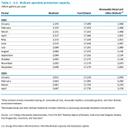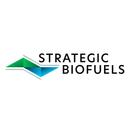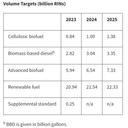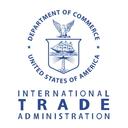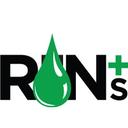North America
The U.S. exported 106,744.4 metric tons of biodiesel and biodiesel blends of B30 and greater in May, according to data released by the USDA Foreign Agricultural Service on July 6. Biodiesel imports were at 119,073.4 metric tons.
Topsoe was selected by HF Sinclair as a technology provider for the production of renewable fuels at its facilities in Sinclair, Wyoming; Cheyenne, Wyoming; and Artesia, New Mexico. All three faciliites utilize Topsoe's HydroFlex technology.
U.S. firms working with clean energy fuels, such as corn ethanol, woody biomass/cellulosic biofuel, and other biofuels, added 1,962 jobs in 2022. Bioenergy electric power generation (EPG) jobs were also up.
Total operable biofuels production capacity in the U.S. expanded in April, according to data released by the U.S. Energy Information Administration on June 30. Feedstock consumption was up when compared to the same month of last year.
As interest in low carbon fuels gains momentum, Clean Fuels Alliance America continues to grow stronger and more diverse by adding new members. Since January, Clean Fuels has welcomed nine new companies.
Bunge and Chevron's Renewable Energy Group Inc., a subsidiary of Chevron Corp., have acquired Argentina-based Chacraservicios S.r.l. Chacraservicios is focused on the cultivation of camelina sativa, which can be used to produce biofuels.
The USDA' on June 30 announced that an estimated 83.5 million acres of soybeans have been planted in the U.S. for 2023, down 5 percent when compared to 2022. Soybean harvested area for 2023 is estimated at 82.7 million acres, down 4 percent.
Eni Sustainable Mobility Spa and PBF Energy Inc. on June 28 announced the closing of a 50-50 joint venture partnership in St. Bernard Renewables LLC (SBR), an operating biorefinery co-located with PBF's Chalmette Refinery in Louisiana.
Strategic Biofuels has entered into an agreement with SLB, a global technology company, to provide carbon sequestration services for for its Louisiana Green Fuels Project, supporting the production of deeply carbon-negative fuels.
The Canadian Council for Sustainable Aviation Fuels launched a roadmap detailing its policy framework, its priority actions, and the next steps to ensure that the Canadian aviation sector remains competitive as it transitions to a net-zero future.
Vertex Energy Inc. on June 26 announced that the company has completed its first series of commercial sales transactions of renewable diesel (RD) from its recently completed biorefinery in Mobile, Alabama.
The USDA on June 26 announced plans to invest up to $500 million in biofuel infrastructure projects via funding from the Inflation Reduction Act, including a new $450 million funding opportunity through HBIIP that is scheduled to open in July.
Volaris announces a $50 million investment agreement alongside Indigo Partners, GenZero, Cleanhill Partners, Frontier Airlines, and Wizz Air. The investment aims to accelerate the production of SAF through the North American startup CleanJoule.
Sasol and Topsoe have signed a landmark agreement to establish a 50/50 joint venture (JV) solidifying their commitment to produce SAF. The JV aims to develop, build, own, and operate SAF plants and market the SAF they produce.
The FAA has opened a public comment period regarding its intention to request OMB approval for a new information collection related to sustainable aviation fuel (SAF) grant funding included in the Inflation Reduction Act.
The governments of Canada and Manitoba announced on June 20 they will provide $2.9 million over two years to support front end engineering design (FEED) for Azure Sustainable Fuels Corp.'s proposed sustainable aviation fuel (SAF) plant.
The U.S. EPA on June 21 released its final RFS “set� rule, which includes a modest increase in biomass-based diesel RVOs for 2024 and 2025. The agency, however, elected not to finalize provisions of the proposed rule related to eRINs.
Boeing launches SAF dashboard to track, project SAF production
Boeing on June 20 launched SAF Dashboard, a tool that tracks expected SAF capacity over the next decade. Based on data collected by BloombergNEF, the Dashboard aggregates total SAF capacity announcements by suppliers on a global scale.
Sen. Raphael Warnock, D-Ga., on June 13 introduced the Advancing Aviation Emissions Reduction Opportunities (AAERO) Act, which aims to alter some provisions of a SAF grant program included in the IRA and boost the program's funding.
The U.S. Department of Commerce's International Trade Administration has announced its Renewable Energy and Energy Efficiency Advisory Committee will hold a in-person meeting on June 27 in Washington, D.C.
The government of British Columbia on June 16 announced that construction is complete on Tidewater Renewables' 3,000-barrel-per-day (45.99 MMgy) renewable diesel complex located at its refinery in Prince George, British Columbia.
TotalEnergies is actively responding to a call from its aviation customers to increase production of sustainable aviation fuel (SAF) and has announced it will be in a position to produce half a million tons of SAF annually by 2028.
A group of 16 senators on June 16 sent a letter to U.S. Treasury Secretary Janet Yellen urging the agency to adopt the U.S. Department of Energy's GREET model as the secondary methodology for calculating tax credits for SAF.
Japan Airlines (JAL) has signed an agreement with Shell Aviation which will see aircraft refueled in Los Angeles with SAF from 2025, supporting JAL's ESG target of replacing 1 percent of its whole jet fuel amount with SAF in 2025.
Vertex Energy Inc. on June 14 announced that it has received approval from the U.S. EPA for the generation of D4 renewable identification numbers (RINs) under the RFS for each gallon of renewable fuel produced at its refinery in Alabama.
The U.S. EPA released updated SRE data on June 15, reporting that one new SRE petition was filed under the RFS in the past month. According to the agency, 28 SRE petitions are now pending, up from 27 that were pending as of mid-May.
More than 2.11 billion renewable identification numbers (RINs) were generated under the Renewable Fuel Standard in May, up from 1.84 billion generated during the same month of last year, according to data released by the U.S. EPA on June 15.
Sen. Tammy Duckworth, D-Ill., on June 13 introduced the Sustainable Aviation Fuels Accuracy Act of 2023, a bipartisan bill that aims to identify the standards required to meet the definition of SAF at the FAA.
The U.S. EPA and Growth Energy filed a notice with the U.S. District Court for the District of Columbia on June 13 agreeing to extend the June 14 deadline to issue the final Renewable Fuel Standard “set� rule by one week, to June 21.
The USDA maintained its forecast for 2023-'24 soybean oil use in biofuel production in its latest WASDE report, released June 9. The forecasts for soybean planted area, yields and season-average prices were also unchanged.
Advertisement
Advertisement




